Events & Promotions
| Last visit was: 05 May 2024, 13:11 |
It is currently 05 May 2024, 13:11 |

Customized
for You
Track
Your Progress
Practice
Pays
08:30 AM PDT
-09:30 AM PDT
12:00 PM EDT
-11:59 PM EDT
10:00 AM EDT
-10:30 AM EDT
08:00 PM PDT
-09:00 PM PDT
12:00 PM EDT
-01:00 PM EDT
10:00 AM PDT
-11:00 AM PDT
| FROM Tuck Admissions Blog: A Summer Internship at Fisher-Price |
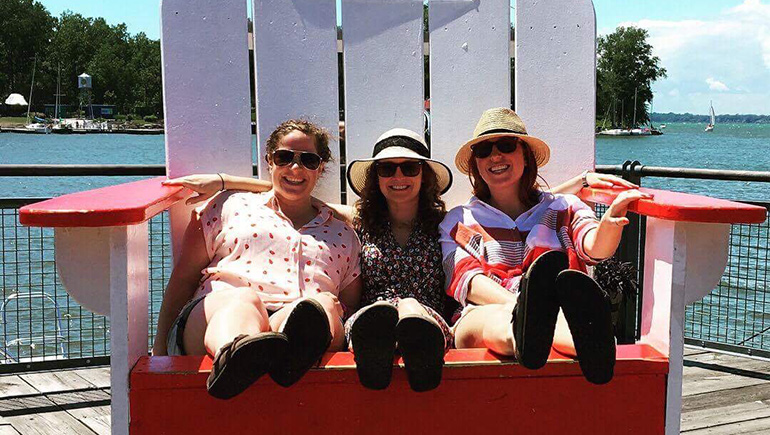 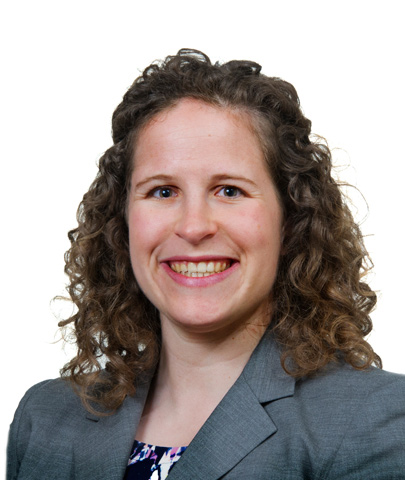 By Caroline Stern T'18 If you asked me a year ago what I would be doing for my summer internship, I never would have guessed that I would be working for a toy company. Prior to Tuck, I worked in a very different industry—wealth management—at a private firm in Canada. For my summer internship, I knew I wanted three things: to work for a large public company, to put the general management perspectives I learned in my first year at Tuck to use, and to work with people who would challenge me and give me an opportunity to grow. So, armed with the Tuck network (Mattel’s Executive Chairman Chris Sinclair is a Tuck alumnus) and a strong interest in brand management, I was thrilled to land an internship at Fisher-Price (owned by Mattel Inc.). What was your favorite toy growing up? This was the first question I was asked as I started my internship on the Global Brand Marketing team at Fisher-Price. As the other interns and I began to reminisce about our favorite toys, it became clear to me how much fun we were going to have this summer! From riding around campus on Power Wheels to late night marketing calls with colleagues in Asia, my internship at Fisher-Price certainly exceeded my expectations. Over the course of the summer, I became a fully-integrated member of the Newborn Marketing team. I led teams of designers, engineers, and researchers through the late-stages of the product development process for FP’s Fall 2018 line, I helped my team create our 2019 marketing strategy, and I worked with colleagues in Europe and Asia to ensure they had the data needed to execute their projects. In addition to my team responsibilities, I had a group project with my fellow MBA marketing interns that focused on the question: How can Fisher-Price address price erosion? Price erosion is a hot topic with many big-box retailers fighting tooth and nail for the lowest price, driving their margins down in the process. This was a particularly difficult intern project and a very important one as price erosion has become a huge issue in the toy industry. We looked at this project as a learning opportunity and spoke with individuals from across the organization working in Canada, California, Arkansas, Wisconsin, and New York. Not only was it a great opportunity to meet more of our colleagues, but we learned a lot about pricing strategies and thinking outside the box. This project was a true testament to Mattel culture—everyone we spoke to was interested in our project and willing to help in any way they could. Fisher-Price’s head office is in East Aurora, NY (a suburb of Buffalo). I had a great time exploring my new neighborhood, from biking to work every day to seeing a pre-season Bills game to hiking at Watkins Glen State Park, this summer was full of new experiences and adventures. As I reflect on my first year at Tuck and my summer at Fisher-Price, I can feel how much I’ve learned and grown in the past twelve months. I’m excited to continue this adventure and see where second year brings me!  Waterfalls at Watkins Glen State Park 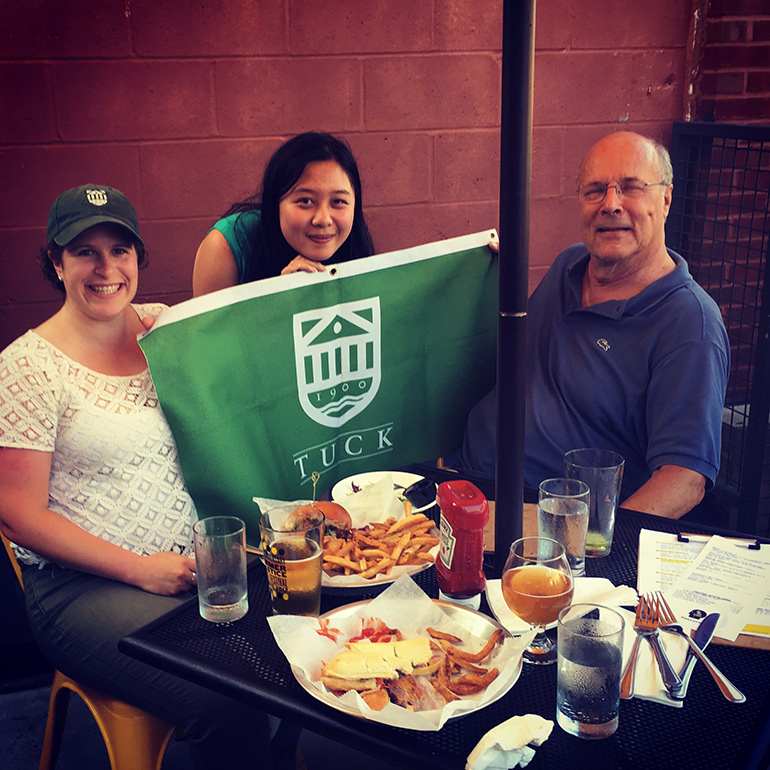 Global Tuck 'Tails in Buffalo with Gillian Wong T'18 and Dan Donaldson T'66 Caroline is a second-year student at the Tuck School of Business. Originally from Toronto, she went on to major in finance at Dalhousie University in Halifax, NS. Prior to Tuck, Caroline spent six years working in a variety of roles at Burgundy Asset Management. At Tuck, Caroline is a commissioner for Tripod Hockey, a leadership fellow, a Revers nonprofit board fellow, and a Tuck student ambassador. She also enjoys taking advantage of Dartmouth’s cabin system. |
| FROM Tuck Admissions Blog: Tuck’s Women in Business & Diversity Conferences |
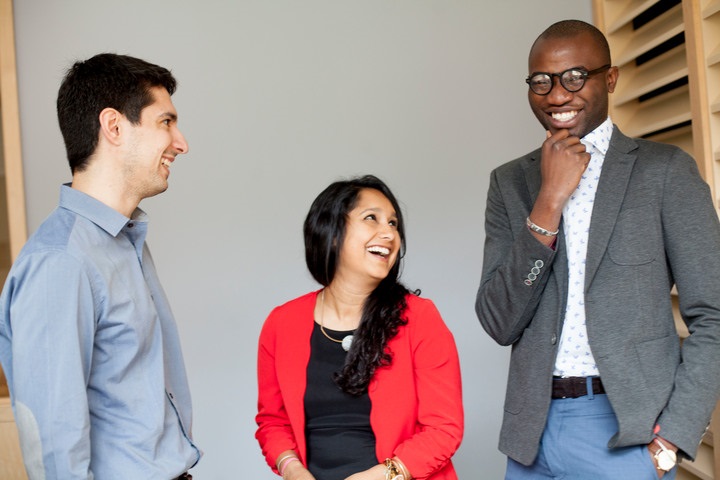 There’s still time to apply for Tuck’s Women in Business Conference, or Diversity Conference! Why you should consider it: First and foremost, it’s an excellent opportunity to get to know Tuck. You’ll learn about Tuck’s rigorous curriculum from faculty, listen to alumni talk about Tuck’s influence on life after graduation, and thoroughly immerse yourself in our distinctive culture. Because the conferences are multi-day, you have several chances to interact with current students over meals, during social events, and in the halls. We also encourage conference attendees who are applying to Tuck during this application cycle, to complete their official interview while on campus. Finally, it’s a wonderful opportunity to engage in a dialogue around gender and diversity in the workplace. Both conferences are led by a dedicated team of students, and are great examples of how Tuckies embrace the opportunity to get involved, take on leadership roles, stretch themselves, and give back. The details you need to know: Women and Business Conference
Diversity Conference
*We believe that attendees will get the most out of these conferences when they're kept at a personal scale and therefore limit attendance. If you are not selected to attend the Women in Business Conference or Diversity Conference, please know that it is not an indicator of your admissibility at Tuck. We hope to see you soon! |
| FROM Tuck Admissions Blog: Webinar: A Walk Through the Tuck Application |
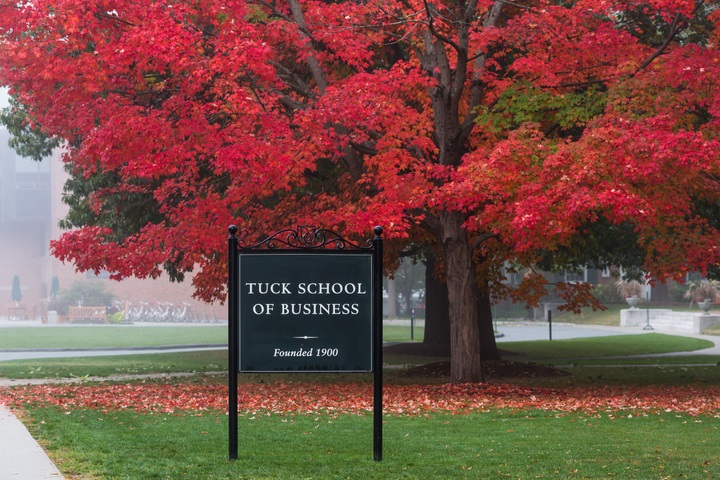 Hi everyone! To those planning to hit submit on October 4 (or before!) and those preparing for a future round, today we share with you a webinar all about Tuck’s application process. Admissions officer and member of the admissions committee, Stephanie Butler, shares tips on tackling essays, getting ready for the interview, selecting recommenders, and the many tools and resources available to help you submit your best possible application. Next, check-out other recorded and upcoming online events! Good luck! |
| FROM Tuck Admissions Blog: The Evolving Media Landscape: An Internship with NPR |
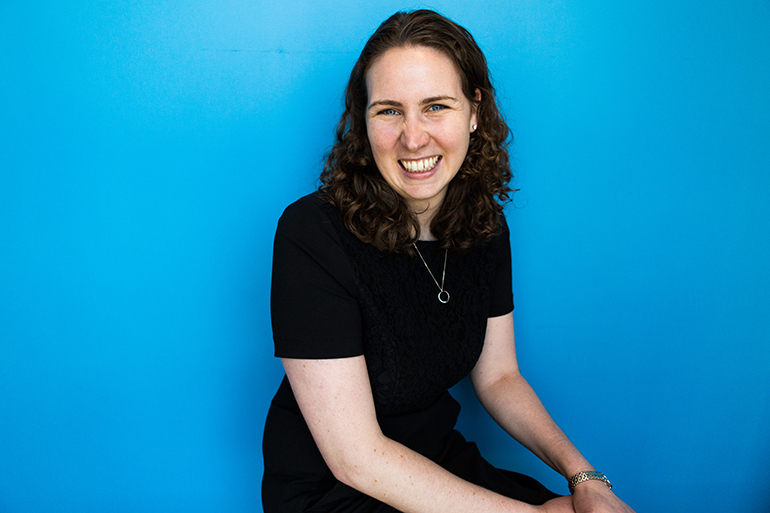 By Meghan McDavid T’18 Prominently displayed in NPR’s headquarters in Washington, D.C. is a poster of longtime NPR host Michel Martin invoking Shirley Chisholm to describe NPR’s independent status. “We are ‘unbought and unbossed.’ The listeners own us.” The reality of ownership is slightly more complex for the public radio network, but its dedication to independent journalism in service of the public is deeply ingrained in the organization. It is evident in NPR’s formal mission, in its strategic plan and priorities, and in the day-to-day work of people throughout the building, from journalists and archivists to programmers and executives. As both a lifelong listener and an MBA intern, this was incredibly heartening to witness firsthand, especially during a busy summer that featured significant developments around the world and just down the street on Capitol Hill. For my part, I served as a summer consultant with the Strategy & Business Partnerships team, which does everything from high-level strategy to business development to internal business excellence. Thanks to the team, especially my boss Michael Lutzky T’06, I worked on substantive, challenging, impactful projects that touched all of these areas and had the opportunity to share my findings with executive decision-makers. I learned more than I thought possible about the media industry, public media, nonprofits, and journalism. Through cross-functional discussions of acquired content, marketing strategies, and more, it was clear that NPR is not just dedicated to its mission but also has a strong sense of itself and its core competencies, which is critical for a legacy organization in the midst of a continually shifting environment. One of the most rewarding parts of my internship was exploring the complex relationship between media and technology through the lens of NPR’s unique capabilities and position. It was exciting and challenging to examine emerging and potential future technological innovations, identify the opportunities they create for NPR and competitive media organizations, and consider how to leverage those opportunities to build on competitive advantages and address potential gaps. While questions about what the future of NPR looks like and how audiences will engage with it underlie almost everything happening throughout the organization, the opportunity to take a broad, high-level approach to these big questions was enlightening. At the same time, by working closely with the Digital Media team, I gained insight into the tactical efforts underway to advance and bolster NPR’s position in the digital marketplace. I was already interested to see how the media landscape—and NPR’s place within it—continues to evolve but after my experience this summer, I’m even more attuned to shifts in technologies, resources, and partnerships that may represent new avenues for media organizations. All that, and I saw puppets perform a song called Socks Are Murder during one of the many Tiny Desk Concerts I attended. 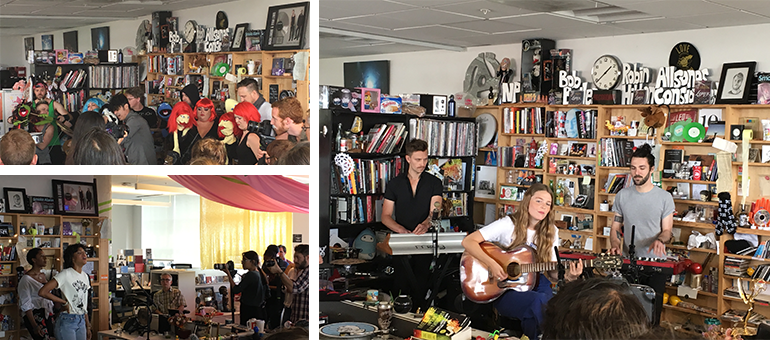 During her summer internship at NPR, Meghan McDavid T'18 attended to a number of Tiny Desk Concerts. |
| FROM Tuck Admissions Blog: Personal, Connected, Transformative: Your Intro to Tuck |
 At Tuck, you create your own future. Through everyday encounters with people who inspire you, global experiences that expand your horizons, and activities that connect you to our community for life, Tuck offers an education as individual as each of its students. Tuck’s Admissions Team is out and about, on the road, in the air, and possibly right in YOUR neighborhood. And if we’re not—or you simply couldn’t make it out to see us that evening—not to worry, we'll bring the event to you. Join Kristin Roth, Associate Director of Admissions, to learn more about Tuck’s personal, connected, and transformative learning community. This event includes a short presentation followed by a Q&A session. If you have questions that weren't addressed during the live event, please feel free to pose them as a comment below. We're sure you'll walk away excited to take the next step to Tuck! |
| FROM Tuck Admissions Blog: The Life of Your Tuck Application |
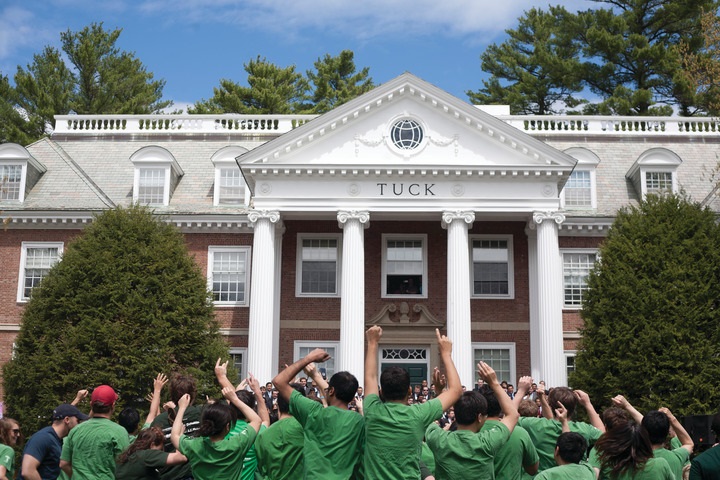 With Tuck’s first application deadline (fast!) approaching, it's the perfect time to shed some light on our evaluation process. Below you’ll find an excerpt from a recent Clear Admit interview with Tuck’s executive director of admissions and financial aid, Luke Anthony Peña. Clear Admit: Walk us through the life of an application in your office from an operational standpoint. What happens between the time an applicant clicks “submit” and the time the committee offers a final decision (e.g. how many “reads” does it get, how long is each “read,” who reads it, does the committee convene to discuss it as a group, etc.). Luke: The life of an application starts long before you click the submit button. In a literal sense, an application begins when you create it. But in reality, it began years and years ago, likely before you even consciously started considering business school. Your application’s life doesn’t begin when we receive it, it begins when you start it. And your application doesn’t belong to Tuck, it belongs to you. So the best are not portraits of Tuck, but portraits of you. I am constantly thinking about fairness and equity. In a world fraught with biases, privilege, and differing levels of opportunities, how do we ensure fairness and equity throughout the application process? There are also nontrivial incentives to overstate qualifications. These are questions I wrestle with daily. I believe the business school evaluation process is ripe for disruption. There is too much complexity, too little transparency. We can do better. Nothing is being turned upside down this year, but I promise to have Tuck at the forefront of how we can innovate in the coming years. But back to your question. We wait until after each application deadline to begin review. Tuck has 10 application readers in total not including myself, and all of our evaluations are conducted by staff. Two have very deep regional experience, one in Latin America and the other in Southeast Asia. We strive to assign applicants from those regions to those readers. Applications not assigned to regional readers are randomly assigned to our other eight readers. I believe this randomization is important to bias reduction. Each reader then reads and evaluates the application in its entirety, including notes from your interview if you have interviewed. Applications are reviewed entirely online. I wish I could give you more detail about our reader form, but we are literally still designing it as we are transitioning entirely to online evaluation for the first time. We have six evaluation criteria: academic excellence, demonstrated leadership, professional accomplishment, interpersonal skills, diversity of background and experience, and global mindset. When the first review is complete, there are several possible outcomes: If you have already completed your own applicant-initiated interview, the first reader will recommend a decision. If that reader is recommending admission, then your file will be routed to a second reader. If the first reader is not recommending admission, then your file is routed to a final reader. If you have not interviewed and you are not recommended for admission, your file will go to a final reader. If you have not interviewed and you are considered for possible admission, then you will be routed to interview. All admitted candidates will have interviewed, either at their prerogative or ours. After interview notes are added to an application file, the file is then routed to a second reader. The second reader then evaluates the application in its entirety, recommends a decision, and the application is routed to a final reader. The final reader is me, so I expect to see all candidates. Now, I do not review every file with the same level of depth as the first and second readers do. They are great at what they do, and I trust them to have reviewed the files thoroughly. But unlike those first and second readers, I am seeing the admissions pool in its entirety. This points to a fundamental reality of the admissions process. It is necessarily subjective, and it is comparative. We must enroll a class so we must compare candidates and decide who will thrive in and contribute to our distinctively immersive culture. Our readers recommend far more candidates than we can enroll. We do not assign numbers or quotas to our readers. They call each and every application as they see it. It falls to me to build a class of 285 candidates best suited to thrive at Tuck. As final reader, I will review the earlier readers’ recommendations and decide to admit, deny, wait pool, or send to committee discussion. All of our readers are on the committee. The committee reviews each remaining application, one by one, and collectively decides whether to admit, deny, or wait pool each applicant. The number we discuss by committee is very high and takes several days. We have no quotas for country, gender, ethnicity; we have no quota per round, we have no numerical preconceptions about what defines a perfect class. The class can and will look different each year based on the quantity and quality of those who choose to apply. And as part of our review process we strive to balance reader autonomy and reader calibration. Each reader can decide the order in which they read the applications themselves, the order of the individual components of the application, and how long they spend reading each application. At the same time, all of our readers use the same form and look for the same criteria. The fate of your review should not depend on the fate of a randomized draw. And we review our readers’ output regularly, because we also know that you can never place too much emphasis and effort on ensuring that there is fairness and equity in the process. I have been very clear and unambiguous about the fact that I don’t intend to change the application at all this year. I am new to this team, I am listening and learning, and my highest priority is to understand the evaluation process and learn from those who have been evaluating Tuck applications for years. My colleagues have spent years refining our approach to evaluation, and I deeply respect the care and thought therein. I very much want to take the appropriate time to understand the current process with careful thought and examination. I will be learning, examining, making observations, and gathering thoughts about what we can improve and what we can change. I am also very proud to be part of a Tuck team that is known for being applicant friendly. Any changes that may come in future years will prioritize the applicant experience. Having said all that, I think it is crazy that the process and timeline for business school applications has not changed in decades. We still ask applicants to compile a large file of materials and send it away and wait and wait and wait while we make admissions decisions. None of the rest of the world still works this way. Elsewhere in the world, we are accustomed to quick feedback and quick turnaround. There is no reason why we can’t move in this direction. We are misaligned with the way that the rest of the world works in terms of decision-making time, effectively utilizing good data, and the kind of service model that would reduce applicant anxiety and provide more transparency and, frankly, more speed. So I do plan to be paying close attention to ways that the application process can be improved. |
| FROM Tuck Admissions Blog: The Life of Your Tuck Application |
 With Tuck’s first application deadline (fast!) approaching, it's the perfect time to shed some light on our evaluation process. Below you’ll find an abbreviated excerpt from a recent Clear Admit interview with Tuck’s executive director of admissions and financial aid, Luke Anthony Peña. CLEAR ADMIT: Walk us through the life of an application in your office from an operational standpoint. What happens between the time an applicant clicks “submit” and the time the committee offers a final decision (e.g. how many “reads” does it get, how long is each “read,” who reads it, does the committee convene to discuss it as a group, etc.). LUKE: We wait until after each application deadline to begin review. Tuck has 10 application readers in total not including myself, and all of our evaluations are conducted by staff. Two have very deep regional experience, one in Latin America and the other in Southeast Asia. We strive to assign applicants from those regions to those readers. Applications not assigned to regional readers are randomly assigned to our other eight readers. I believe this randomization is important to bias reduction. Each reader then reads and evaluates the application in its entirety, including notes from your interview if you have interviewed. Applications are reviewed entirely online. I wish I could give you more detail about our reader form, but we are literally still designing it as we are transitioning entirely to online evaluation for the first time. We have six evaluation criteria: academic excellence, demonstrated leadership, professional accomplishment, interpersonal skills, diversity of background and experience, and global mindset. When the first review is complete, there are several possible outcomes: If you have already completed your own applicant-initiated interview, the first reader will recommend a decision. If that reader is recommending admission, then your file will be routed to a second reader. If the first reader is not recommending admission, then your file is routed to a final reader. If you have not interviewed and you are not recommended for admission, your file will go to a final reader. If you have not interviewed and you are considered for possible admission, then you will be routed to interview. All admitted candidates will have interviewed, either at their prerogative or ours. After interview notes are added to an application file, the file is then routed to a second reader. The second reader then evaluates the application in its entirety, recommends a decision, and the application is routed to a final reader. The final reader is me, so I expect to see all candidates. Now, I do not review every file with the same level of depth as the first and second readers do. They are great at what they do, and I trust them to have reviewed the files thoroughly. But unlike those first and second readers, I am seeing the admissions pool in its entirety. This points to a fundamental reality of the admissions process. It is necessarily subjective, and it is comparative. We must enroll a class so we must compare candidates and decide who will thrive in and contribute to our distinctively immersive culture. Our readers recommend far more candidates than we can enroll. We do not assign numbers or quotas to our readers. They call each and every application as they see it. It falls to me to build a class of 285 candidates best suited to thrive at Tuck. As final reader, I will review the earlier readers’ recommendations and decide to admit, deny, wait pool, or send to committee discussion. All of our readers are on the committee. The committee reviews each remaining application, one by one, and collectively decides whether to admit, deny, or wait pool each applicant. The number we discuss by committee is very high and takes several days. We have no quotas for country, gender, ethnicity; we have no quota per round, we have no numerical preconceptions about what defines a perfect class. The class can and will look different each year based on the quantity and quality of those who choose to apply. And as part of our review process we strive to balance reader autonomy and reader calibration. Each reader can decide the order in which they read the applications themselves, the order of the individual components of the application, and how long they spend reading each application. At the same time, all of our readers use the same form and look for the same criteria. The fate of your review should not depend on the fate of a randomized draw. And we review our readers’ output regularly, because we also know that you can never place too much emphasis and effort on ensuring that there is fairness and equity in the process. I have been very clear and unambiguous about the fact that I don’t intend to change the application at all this year. I am new to this team, I am listening and learning, and my highest priority is to understand the evaluation process and learn from those who have been evaluating Tuck applications for years. My colleagues have spent years refining our approach to evaluation, and I deeply respect the care and thought therein. I very much want to take the appropriate time to understand the current process with careful thought and examination. I will be learning, examining, making observations, and gathering thoughts about what we can improve and what we can change. I am also very proud to be part of a Tuck team that is known for being applicant friendly. Any changes that may come in future years will prioritize the applicant experience. |
| FROM Tuck Admissions Blog: Looking back at September 2017: the shortest month of my life |
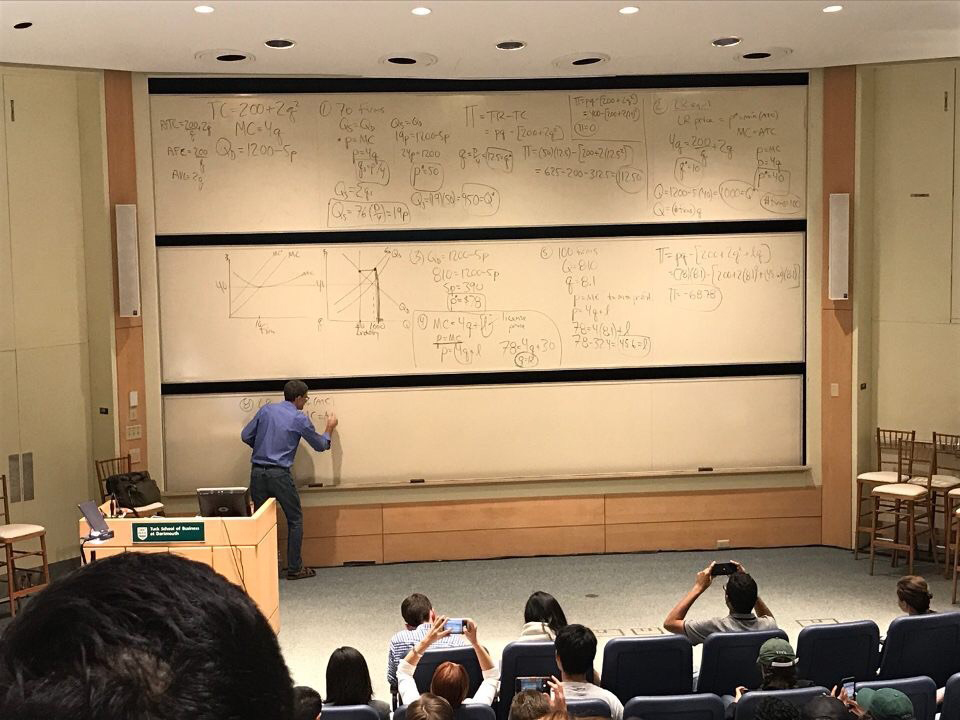 By Akshat Kalra T’19 Long before I arrived in Hanover, many Tuckies had spoken about the initiation into the Tuck life: Fall A. In the excitement of moving and meeting new friends, I had forgotten about this four-week academic term that awaited us right after Orientation. I distinctly remember looking at the schedule for the first time and thinking, “Four subjects over four weeks with JUST two classes a day?! What the hell am I supposed to do with all this FREE TIME I will have?” Fall A covers four subjects that are part of Tuck’s core curriculum, i.e., subjects that are essential for all managers. All of these subjects were taught by amazing professors whom we all have come to love over this past month. Now, at the start of the term I hadn’t realized all these are taught using the Case Method (like most other courses at Tuck), meaning, before each session, we would go through several readings and a case, develop a hypothesis, and discuss the same at length within our Study Group. For context, our entire class is divided into groups of five or six diverse individuals that will be your first family here at Tuck. Our Group (SG12) met daily for several hours as we grappled with both qualitative and quantitative problems. 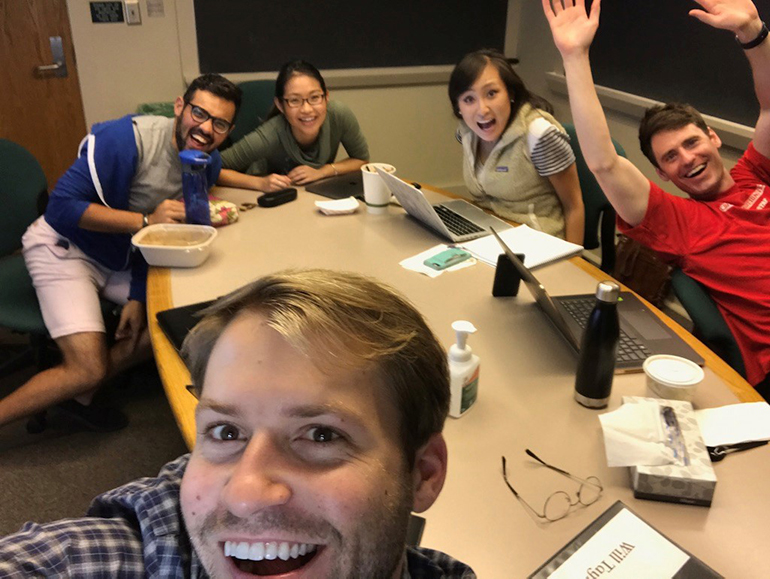 The class of 2019 is divided into groups of five or six diverse individuals that will become each student's first family at Tuck. I loved this hectic Fall A not only because it brought our group together (I cannot imagine my Tuck experience without them), but also because its core subjects were purely practical. I was never a fan of statistics. In fact, I wondered why we would study it in a business context! Yet, our Statistics for Managers course not only taught us how to use a given formula, but also how to interpret its results in a business setting. I was amazed to learn how organizations use standard deviation as a tool to make critical decisions with the Six Sigma Approach (don’t worry, I didn’t know the term until two weeks back) and understand the whole concept with an example of the American and Japanese automobile industries. Similarly, I finally have a logical argument to counter my friends who wonder why I spend so much on the latest iPhone every two years: Apple has smart folks who have definitely studied the concept of consumer surplus in Management Economics (and now, so have we) and understand how to best extract it from would-be iPhone purchasers—yours truly included! Remember, this is just the academics. Fall A is also the time when the 50+ clubs at Tuck start their activities. There’s a packed social calendar on which I’ll hardly comment—social gatherings, apple picking, Tripod Hockey … the list goes on and on! With Fall A behind us, we T’19s are excited about Fall B; if it is anything close to Fall A, we are in for another adventure! 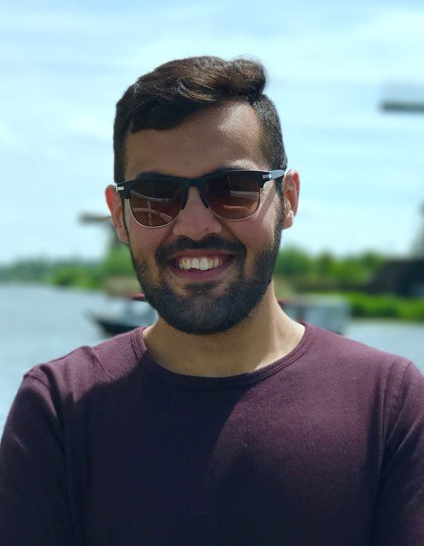 Akshat Kalra is a first year student at Tuck. Before coming to Hanover, he worked in Consulting and Venture Capital in India. Post Tuck, he hopes to move into a consumer internet company to build exciting products. He is originally from Delhi, India but prefers the small town life of the Upper Valley. |
| FROM Tuck Admissions Blog: Adventure, Fun, Love: My Tuck Experience |
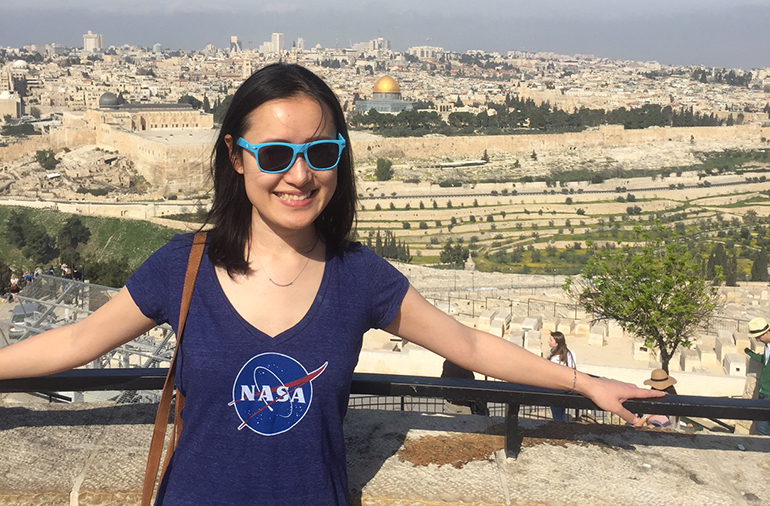 By Frances Tan T'18 When I decided to come to Tuck, I first saw it as an opportunity to have a unique life experience. I used to live in big cities with large populations and skyscrapers. I thought, if I could study for my MBA while living in a unique environment far from crowds with green spaces and snow for two years, wouldn’t that be cool? As I look back on the past year, I’m glad that I not only decided on Tuck, but I’m also grateful that this experience has come with many surprises. I would describe the Tuck experience with three words: adventure, fun, and love. Adventure Outdoor sports are an exciting adventure at Tuck. I joined a pre-term canoeing trip with 12 classmates last August. We spent a week together rowing boats on the Connecticut River, setting up tents, barbecuing in forests and hiking mountains for hours. It was my first time living in the wild, and I learned the true value of teamwork through this unique outdoor experience. The outdoor trip made us closely bonded. We came from different countries in the world and barely knew each other at the beginning. After the trip, we became best friends on campus and supported each other through the school term. During the school term, I also played golf at Hanover Country Club and skied in Killington with my classmates. In different seasons, I could always find adventures and felt great doing it. Fun Studying usually seems boring and stressful. However, the study model at Tuck turned out to be a fun learning process. For instance, I joined Professor Adam Kleinbaum and 24 classmates on an experiential course to Israel in March. It was one of the GIX courses at Tuck during the spring term. GIX courses give students the opportunity to travel to a new country and explore its politics, history, cultures, and businesses. During the Israel GIX course, I had deep exposure to Israeli startups, defense systems, politics, history, and local communities. I also had opportunities to talk with local venture capitalists, young entrepreneurs, politicians, and military soldiers. Every day, Tuck students took turns researching the backgrounds of places we would visit and sharing our findings with the group. After each visit, we exchanged ideas on the bus. No doubt, the world is the best classroom to learn in, and GIX is unique way to obtain, exchange, and digest knowledge while traveling the world. When I came back to the U.S., Professor Kleinbaum and I started a pioneering business buddy program between Palestinian and Tuck students. The program paired ten students together to support one another and achieve mutual professional benefits. I am very proud of initiating the cross-region buddy program to make impact out of the GIX course. Professor Paul Argenti’s corporate responsibility course was one of my favorite in-class learning experiences. It was inspiring and valuable. I used to think the concept of corporate responsibility was common sense. However Professor Argenti’s lectures challenged and transformed my traditional thinking. Through his vivid illustration of cases on Shell, Walmart, and other well-known corporations, I learned the triple bottom line sustainability system and realized the importance of NGOs. Professor Argenti also invited CEOs to class to share real cases such as a lecture from Neil “Dutch” Kuyper, CEO of Parker Ranch in Hawaii. During my first year project with an Atlanta-based conglomerate on sustainability, Professor Argenti and his lectures greatly helped me to offer valuable analysis and advice to clients. I will carry forward what I learned in his class in my future career and personal development. Love When I first came to Hanover, I lived in a farm house in Vermont and didn’t have a car. Several classmates noticed and they spontaneously came to pick me up on campus and gave me a ride to my house 10 miles away. This continued through winter when the weather was extremely cold and days became shorter. Tuck also has the tradition of “safe ride” which gives students free rides home late at night. Though winter in Hanover can be extremely cold, I felt warm in my heart by what my classmates had done to make my life easier. 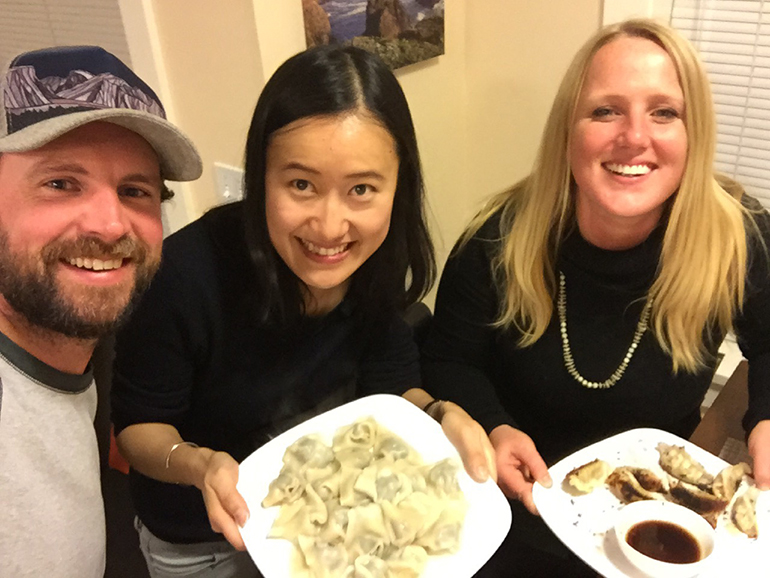 Tan, along with other Tuck students, joined fellow classmate Adam Koziatek T'18 (left) and his Tuck Partner, Rhea (right), in their home for a small group dinner. I also found myself often in different homes enjoying wonderful dishes with my classmates and professors, which made me feel at home while being away from home. Adam Koziatek T’18 and his wife Rhea invited me to make dumplings; I cooked Chinese dinner with Anna Macharackova T’17 and friends; Kohei Suwabe T’18 and his wife hosted me to have Japanese cuisine. Professor Sydney Finkelstein and his family opened their house to welcome me and my fellow classmates to cook and enjoy Dutch dishes. These moments built up a sense of family and love during my Tuck experience. My time on the Tuck campus may be limited, but my Tuck experience has been filled with adventure, fun, and love that will stay with me forever. Get to know Frances Hometown: Shanghai & Hong Kong Undergraduate school and degree: Hong Kong University of Science and Technology, Finance Previous work experience: Associate Director, UBS Private Wealth Management Summer internship: Google Leadership Roles in Business School: International Club Chair Entertainment, Sports and Media Chair Representative of Tuck at MBA Case Competition UCLA Entertainment Case Competition in Los Angeles IESE Roland Berger International MBA Case Competition in Barcelona Advice to applicant for Tuck: Protect your dream and be persistent Favorite Quote: "Life has no limitations, except the ones you make." –Les Brown |
| FROM Tuck Admissions Blog: Tuck Entrepreneurship Club Heads to Dartmouth Regional Technology Center |
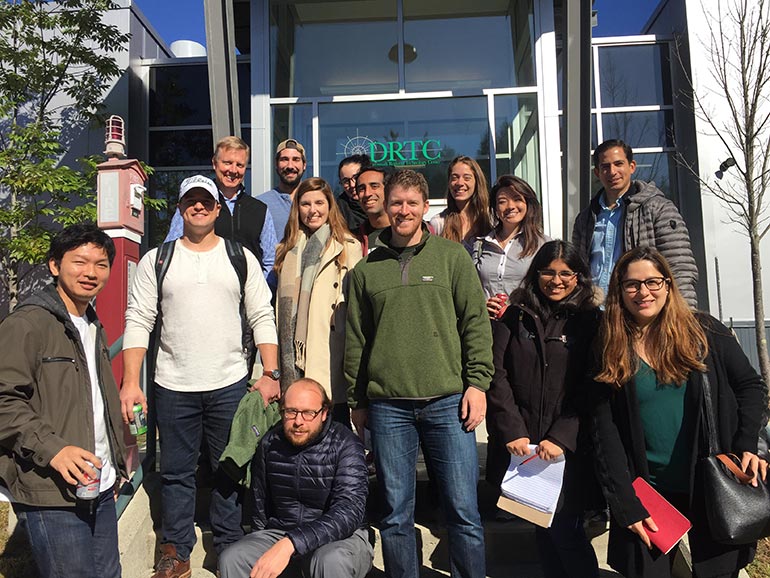 By Erica Toews T'18 A group of Tuck and Thayer students visited the Dartmouth Regional Technology Center (DRTC), a business incubator four miles from campus with fifteen active ventures. DRTC is a nonprofit organization that rents office and laboratory space to ventures in the Upper Valley. Trip Davis, who teaches Entrepreneurial Thinking in the winter, gave us a tour of the facility and introduced us to entrepreneurs from three startups. The mission of DRTC is to promote and support new venture growth and create economic development in the local region. DRTC’s value proposition is flexibility: leases are month-to-month and everything, including walls and doors, is moveable. There is no hubris in that DRTC understands entrepreneurs need to go where they need to go and supports them when they move out. John Currier, CEO of Mobile Virtual Player (MVP), spoke about the first ever self-powered mobile training device. This robotic dummy allows NFL, NCAA, and high school football players to practice tackling without injuring one another and has reduced soft tissue damage by 80 percent. The MVP is so effective at simulating a moving target that using the device in practices does not impact the probability that teams will win real games. We saw where development takes place, in the garage below DRTC, and we took turns using the remote control to move the robot up and down the parking lot. T’14s Jack O’Toole and Matt Hanson sat next to each other in a Tuck course on entrepreneurship. When they heard a Dartmouth chemistry professor pitch a device he invented to detect smoking, they approached him after class, and FreshAir Sensor was born. FreshAir devices monitor airborne concentrations of tobacco and THC, collecting data on exactly where and what time people are smoking. The company saves hotels thousands of dollars a month by generating fees from people who violate smoke-free policies as well as avoiding cleaning costs by deterring people from smoking. The cartridges in the sensors must be replaced once a year, but they are easily changeable for users. To make the cartridges easy to change, Jack told engineering to replicate the design of one of his kid’s Sesame Seed cassette players. The last entrepreneur we met was Kevin Isett, the CEO of Avitide. Avitide develops technology to purify biopharmaceuticals, partnering with drug manufacturers to decrease waste. The platform technology reduces process development time, program risk, and cost of production, enabling biopharmaceutical companies to scale products. I left DRTC inspired by the fact that entrepreneurship and innovation are taking place right here in our community! Read more from Erica |
| FROM Tuck Admissions Blog: Q&A with Tuck Student Ambassador: Siena Hickey |
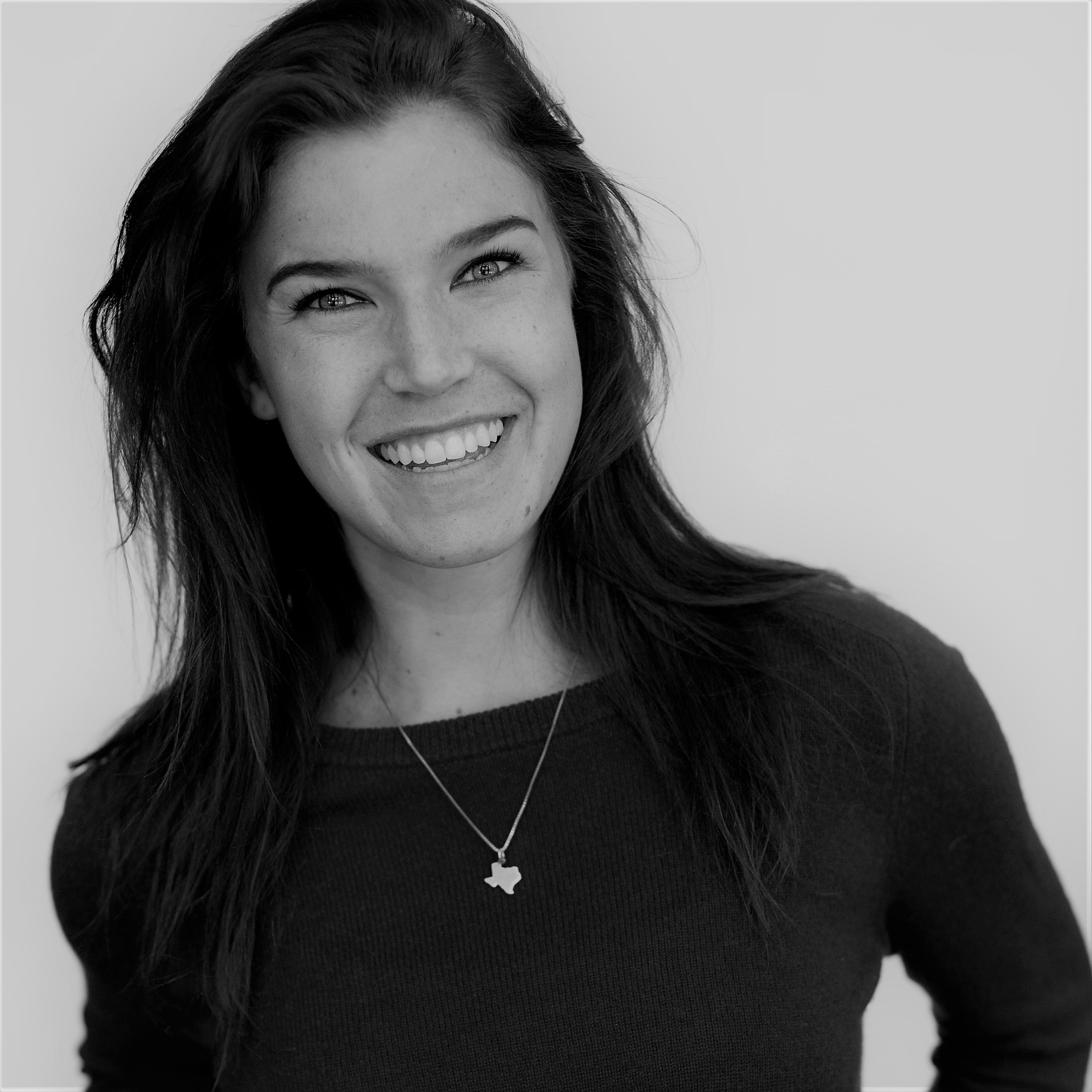 Tuck Student Ambassadors collaborate with the Admissions Office to share their Tuck experience with prospective students. Part of this group is structured to represent eight geographical regions, with a Regional Captain leading each. In the coming months, we'll introduce you these student leaders! Today, meet Siena Hickey, T'18 and Africa Co-Captain. Please reach out to Siena, or any other Student Ambassador using this website. They love to connect with future Tuckies! Tell us a little bit about yourself. I was born in Texas, went to undergrad at Boston University, and lived in New York City and South Africa working in international strategy roles before coming to Tuck. Why Tuck? Tuck has the unique advantage of being close enough to major cities for recruiting while far enough away to completely dedicate yourself to the MBA experience. While learning about Tuck I definitely got the impression I’d be with a class equally attracted to this sort of immersive environment. Everyone at Tuck chooses a different path. What’s your life at Tuck like? I’m co-chair of the Tuck Athletic Club, help out with Health and Wellness initiatives on campus, actively participate in other clubs such as the Design Club and Tuck Africa Club, and represent African countries as a Tuck Student Ambassador. Transformational Moment A favorite Tuck experience was my Global Insights Expedition (GIX) to Singapore and Myanmar. Through this course we explored the culture and business climate of these countries with a richness that would not be possible through tourism travel alone. I enjoyed leaving the woods of Hanover to sit in new global classrooms with my classmates and learn more about them through the experience as well. Why did you join the Student Ambassador Team? I want to pay forward the transparency and willingness to connect that drew me to the people of Tuck. These qualities resonated with me as I went through the application process. What surprised you most at Tuck? How willing professors are to meet for informal chats about anything from the assignment to their previous experience to your career aspirations. There is a genuine sense of mutual interest between professors and students here. Any advice for prospective students? Be genuine in your interests and honest in your experience. Curiosity is not ignorance. |
| FROM Tuck Admissions Blog: An Uncertain, Yet Transformational, Detour |
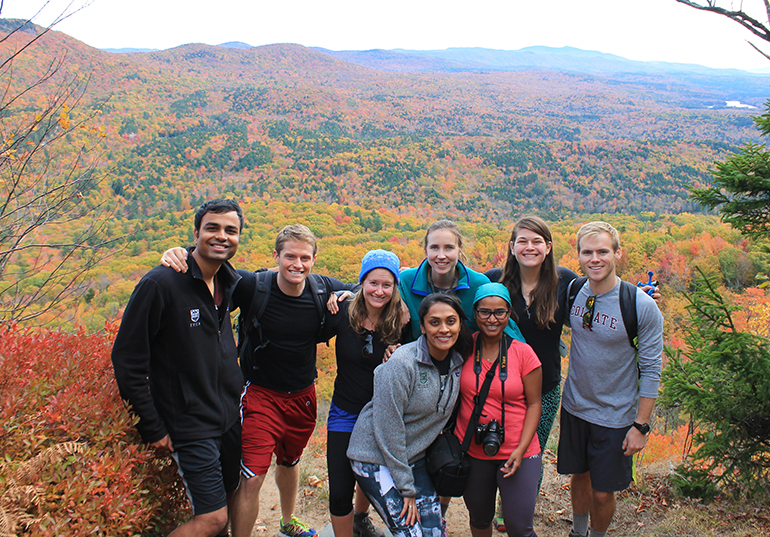  By Courtney Bragg T’18 I worked at a job I loved (in urban education) in a city I loved (Washington, D.C.) prior to Tuck. D.C. is a different city than I left it, but it has always felt like home. It felt like home in a way that my first year at Tuck did not yet. Sitting at the airport now heading back to Hanover, I feel like I am heading home. As a non-traditional student, whose work felt important and urgent, deciding to get my MBA felt a bit like taking an uncertain detour. I knew the operational skills of finance and accounting were valuable; however, it was the leadership training that I was most excited to explore. Overwhelmed at orientation, I wrote down why I was at Tuck, “To become a leader I respect and with whom I would want to work.” 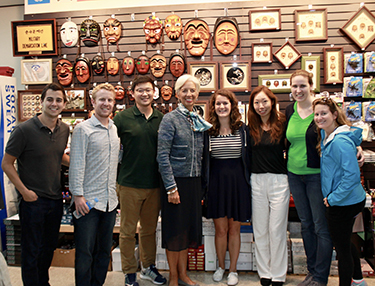 Bragg with classmates in the demilitarized zone between North Korea and South Korea as part of a fun trek where they ran into the managing director of the International Monetary Fund. But Fall A was a bit of a blur, delving into omitted variable biases and marginal costs. And then came Decision Science, Capital Markets, and FMAR. I wondered if I was in over my head. As I prepared for my FMAR final, I asked my professor a frantic question about the distinction between accrual and deferral expenses—she lit up, “See, you’ve got it!” My lack of certainty was clearly visible, but she reassured me that conceptually I understood and the mechanics are illustrative and reinforce those concepts. With the first-years now stressed staring at T-accounts, I am amazed by how much I learned in such a short span of time. The Fall at Tuck is intense and it is exactly the immersive experience I was seeking. In my second year, I am taking more time to enjoy the stark beauty of fall in the Upper Valley and reassure first-years that they will be in awe of how much they learn and that it is the learning, not the mechanics they will retain. This summer, I was having coffee with a venture capitalist I admire and she asked me why I was getting my MBA and specifically, why I chose Tuck. I explained that I wanted to invest in myself and my education and I wanted to be intentional about making that investment. People do not stop by Hanover—they opt in. She nodded and smiled and acknowledged that my approach was right. A Tuck education extends beyond two years of reflection and recruiting—it is both the process of immersing yourself within the community and making progress in becoming the kind of leader you aspire toward.  A team of Tuck students participates in a candle lighting service at the Shwedagon Pagoda during a Global Insight Expedition to Myanmar. My professors, my classmates, we all have chosen to join the Tuck community. There is a power in not stopping by, but opting in. In the blur of classes and recruiting, it is easy to lose focus of why you are making this investment. Think about why you are going to business school and what you really hope to get out of it and test for that. Once you get to campus, keep that in focus. Take time to have dinner with incredible visitors and fall down the mountain at Killington (if you are a South Florida kid like me who is too competitive and too naïve to properly learn to stop). My experiences at Tuck, from chatting with my Managerial Economics professor about the intersection of ethics and economics in pricing Epi Pens to traveling to Singapore and Burma to explore the juxtapositions of post-colonial development are demonstrative of what it means to be at Tuck—to opt in. While it was great to be back in D.C., I am excited to be heading home. 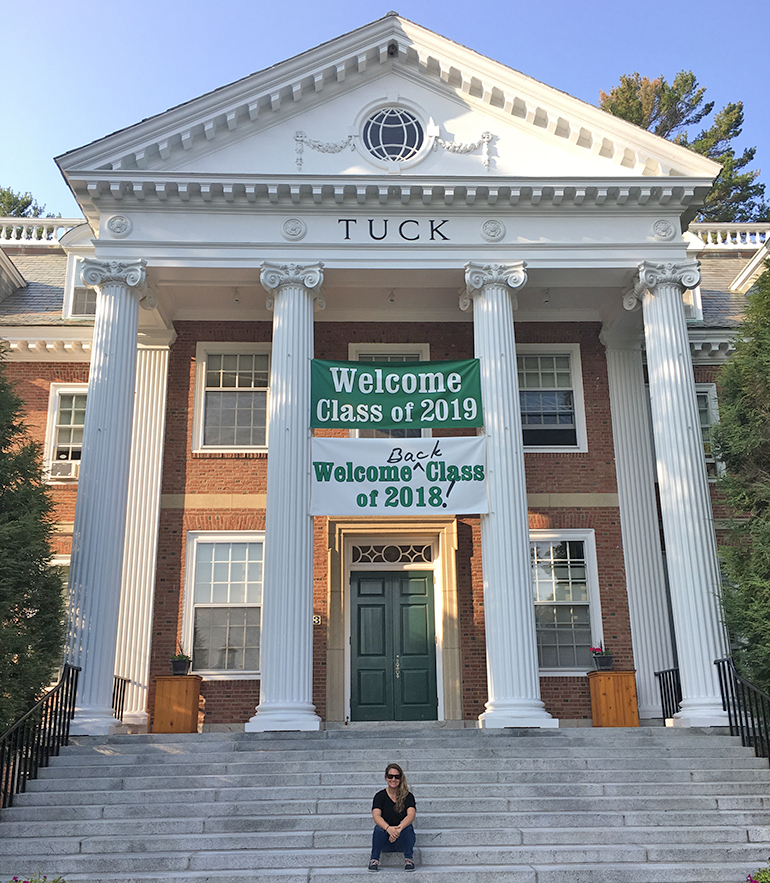 Courtney is a second-year MBA student who grew up in South Florida. Prior to Tuck, she worked primarily in education, first at KIPP DC and then at a startup in South Africa. This summer, she interned in tech at New Relic in San Francisco and got to host the incoming first-year students during their tech trek. On campus, you can find her mentoring a first-generation undergrad, serving as a Revers Board Fellow with Habitat for Humanity, or researching cheap flights for her next adventure. Courtney graduated from Washington University with studies in Urban Studies, Education, and English Literature. She grew up jet skiing and has kayaked Antarctica—she hopes to kayak Greenland this summer to check out the other pole! |
| FROM Tuck Admissions Blog: The Athlete’s Voice: Tools for the Transition |
 Note: This article was originally published by the Track & Field Athletes Association (TFAA) By Lashinda Demus As a member of the TFAA board we are constantly seeking out various benefits to provide athletes. When the opportunity to be part of an Ivy League executive business program arose, I immediately became interested. Who would pass up the opportunity of being involved with the highly ranked Tuck School of Business at Dartmouth?! Being a professional track & field athlete can be very difficult financially if you are not in the top three in the world. Luckily, I’ve been ranked in the top three until these past few years. Before the decline in performance I never took time to think about my transition into the “real world” until I was forced to. This was the perfect launching pad. "Before the decline in performance I never took time to think about my transition into the real world until I was forced to." The Next Step: Transition to Business program is designed specifically for transitioning Olympians and veterans. We all had to apply to be considered, which wasn’t strenuous, but it was straight to the point; either the program felt you were compatible or they didn’t. Fortunately they thought I was. I didn’t know what to expect, but I knew what I planned to get out of the program, a glimpse at what MBA coursework looks and feels like as well as to have a great reference for my future endeavors. The program was two and a half weeks and in class full-time, including Saturdays and Sundays. We received a full scope of running a business form spreadsheet modeling to financial statements to financial analysis. These were the more difficult courses for me; I really wanted to pull my hair out! LOL! But then we moved onto business strategy, branding, operations and negotiations; this was more my speed. We had a lot of group activities where we tested out different strategies and incorporated techniques that we learned about. This was one of my favorite parts because I’m so competitive and wanted to win so badly. 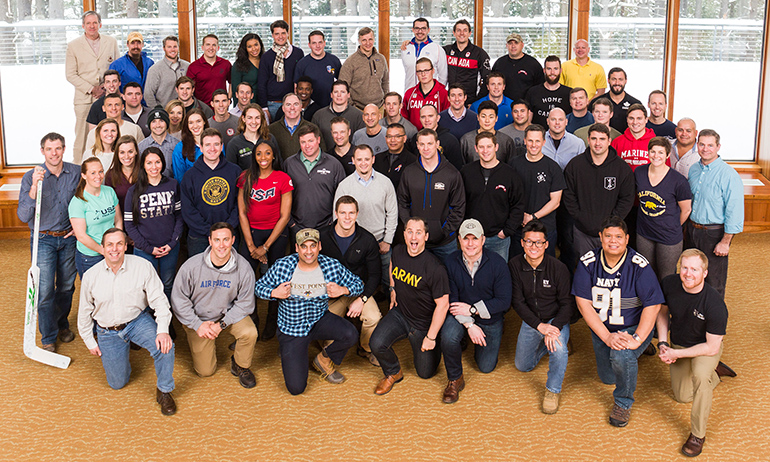 One of the best parts about the program in my opinion was all the guest speakers from various fields as well as the one-on-one coaching. We had prominent leaders in their respected fields there for us to pick their brains and ask as many questions as we could think up. These leaders included Paul Raether, a Tuck graduate and General Partner at Kohlberg Kravis Roberts & Co, Robin Hayes, President and CEO of JetBlue, and Olympian Jim Craig, President at Gold Medal Strategies. The even cooler part was that every single speaker opened themselves up to us to reach out anytime outside of the program. I thought that was extremely considerate. For the one-on-one coaching we were partnered with current MBA students that helped with resume building and formats and to answer any questions on business and business school. I even ran by a couple of business ideas for some feedback. One thing that became apparent to me is that track & field athletes are missing important developmental tools to help with transitioning from sport to the workforce, especially when you want your options to expand further than coaching. There are certain ways to go about transitioning properly and most track & field athletes are either too far away to see the road ahead or don’t even know that it exists. The TFAA is looking forward to providing more opportunities to set all of us on the right path after our athletic careers end. *Applications for the 2018 Next Step: Transition to Business program are now open. Submit your application by December 1, 2017. APPLY NOW 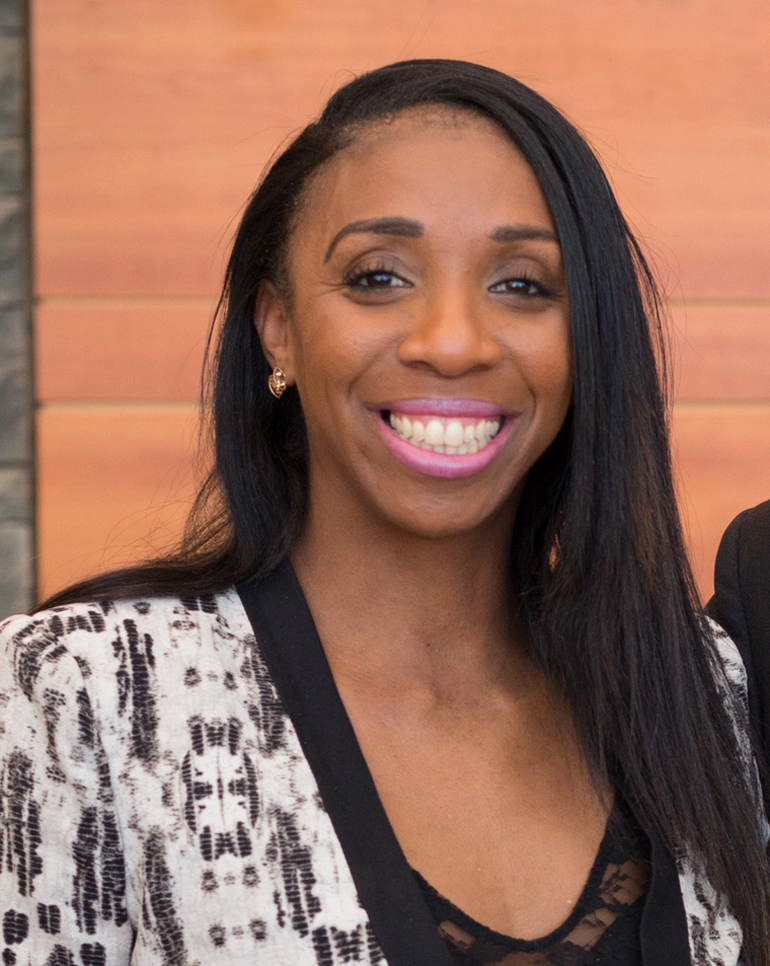 About Lashinda A 2017 graduate of the Tuck Next Step Program, Lashinda Demus is an American hurdler who specializes in the 400 meter hurdles, an event in which she was the 2011 world champion and 2012 Olympic silver medalist. About the TFAA The Track & Field Athletes Association (TFAA) is a 501(c)(4) organization formed to support the rights and interests of professional track & field athletes. We are the Athlete’s Voice. Visit trackfieldaa.com for more information. About Next Step |
| FROM Tuck Admissions Blog: Tuck’s Core Curriculum Makes Short Work of B-School Goals |
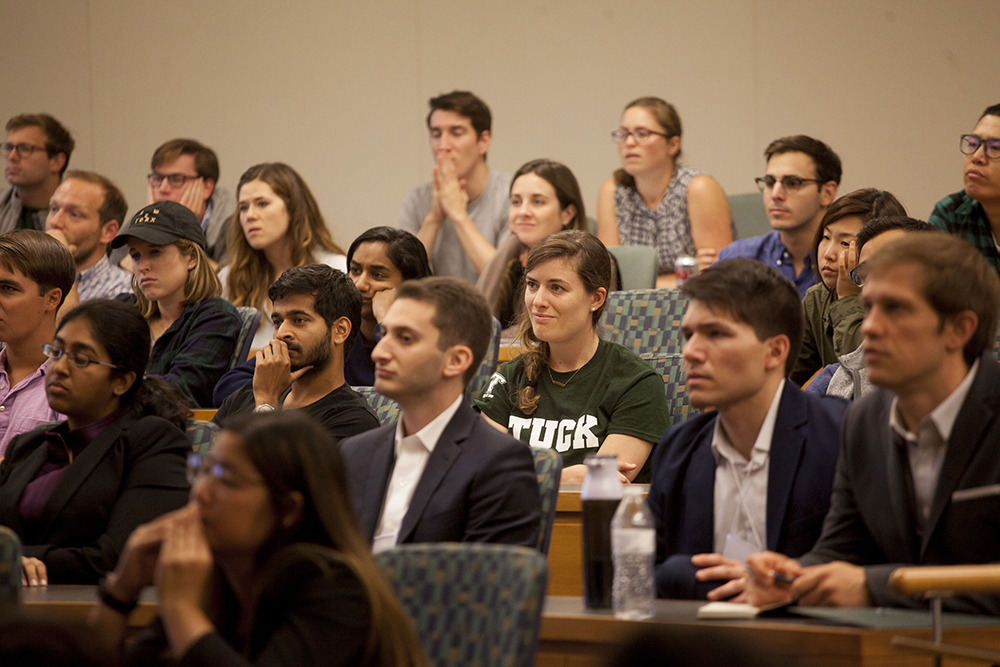 I came to business school hoping to learn new things, meet great people, and gain insight into different industries but never would I have guessed how quickly Tuck would allow me to achieve these goals! Tuck takes pride in its rigorous academic curriculum. This experience equips students with the analytical capabilities required to be wise leaders, able to judge when and how to take risks. The first half of the Fall semester, Fall A, includes classes in managerial economics, statistics for managers, analysis for general managers, and leading individuals and teams–and in only four weeks, from the first class to finals. The inclusion of “manager” in these course titles isn’t ornamental; the courses cover the theory I spent semesters learning in my undergraduate economics degree in a matter of weeks, prioritizing the application of theory to real business problems. These included making a go-no-go decision for a smelter project in the face of political upheaval, helping a software company segment its customers to maximize profit, and advising a new CEO on how she should spend her first 24 hours in a company riddled with pressing problems. The work was challenging but hugely rewarding and the best aspects were the classmates I had the opportunity to work with. At the end of orientation, Tuck strategically assembled us into “study groups” of five or six students. My study group of five represented three nationalities, work experience in six countries, and diverse industry backgrounds from nonprofits, wealth management, pharmaceuticals, and data science. We worked together very closely, helping each other prepare for cases, complete group assignments, and manage the busyness of business school life. We became each other’s career coaches, professors, and cheerleaders. We formed, stormed, normed, and performed, learning to leverage our respective strengths, acknowledge our weaknesses, and openly give each other feedback on our group performance. What we learn in classes doesn’t stay in the classroom. Toward the end of Fall A, I attended a recruiting reception hosted by a large technology startup. As I listened to the firm’s history and strategy moving forward, I found myself applying the toolkit I learned in my classes to analyze and evaluate what was being presented. I clearly wasn’t alone in my thinking because immediately after the presentation I was part of a discussion with classmates assessing the way the firm had used price discrimination practices to move up the price-volume market pyramid, segmenting the firm’s value chain, and evaluating whether its newest technological investments represented an expansion of core competencies. It was satisfying to see how your business training had given us a context to debate and discuss these issues. Coming to an Ivy League college, I had very high expectations for the coursework and teaching, and both have exceeded those expectations. As I continue through the core curriculum, I am confident that I will build a breadth of business concepts, vernacular, and frameworks that will allow me to take better advantage of deeper discussions in elective courses and, ultimately, set me up well for my career post-Tuck. 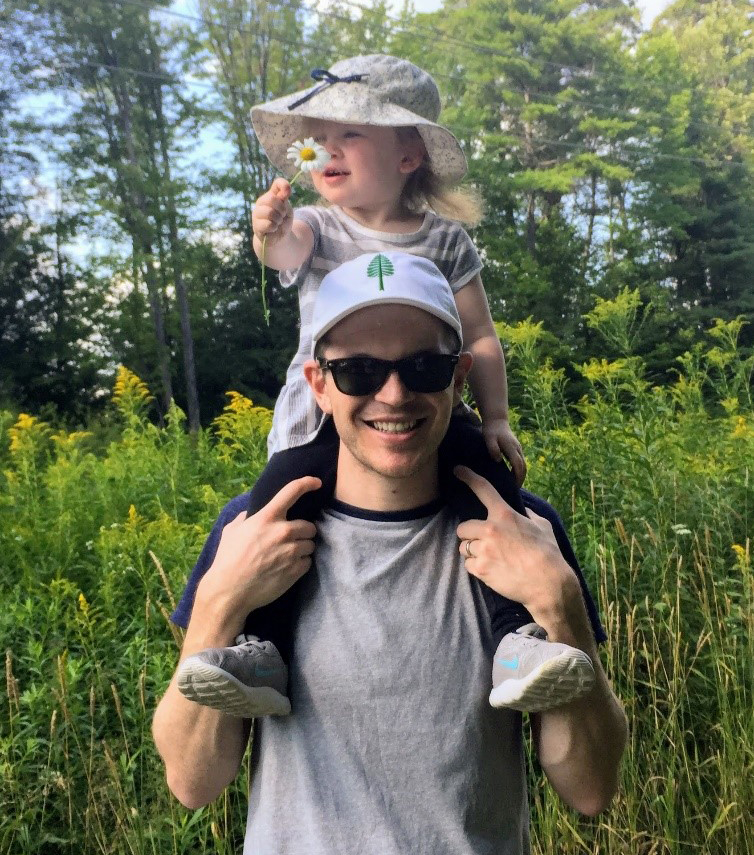 Sam Humbert is a T’19 who came to Tuck from Australia via Hong Kong, which is the birthplace of his 2-year-old daughter and where he spent four years working in financial services. |
| FROM Tuck Admissions Blog: The Tuck WIB Conference: Where it all Began |
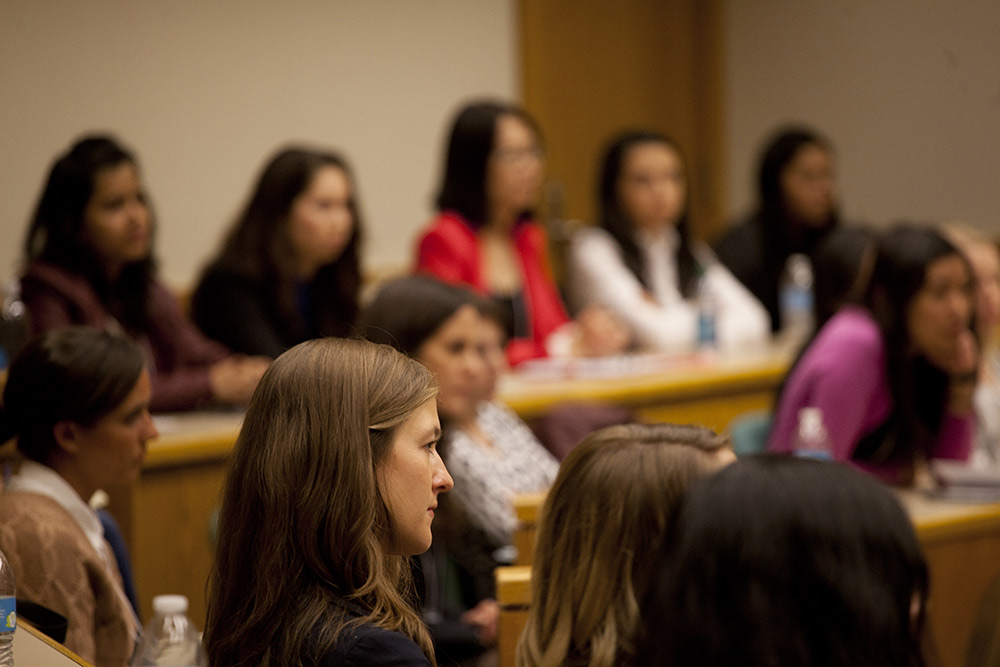 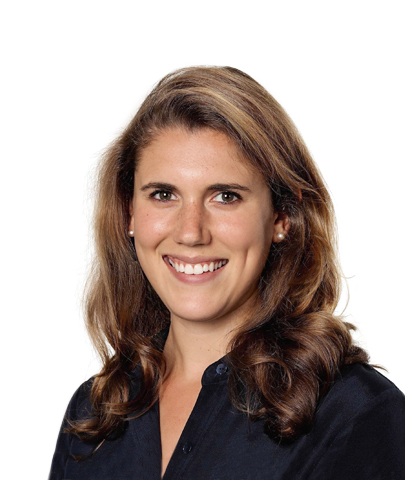 By Annie Johnson T'19 When I arrived at Tuck for the Women in Business Conference (WIBC) last year as a prospective student, I wasn’t totally sold on getting an MBA. While I appreciated the long-term value, it was not the usual path in my industry (fine arts) and, truthfully, I wasn’t sure an MBA admissions office would be sold on me! One of the conference’s first events was one that intimidated me the most: a mock class. I doubted I would be able to participate as the subject, marketing, was interesting to me but also completely foreign. Professor Kusum Ailawadi’s class completely altered my attitude. I not only followed along (a true testament to her skill as a professor), but sat on the edge of my seat as she discussed marketing practices I had encountered in my day-to-day life, but had never developed the technical vocabulary to truly appreciate or analyze. A year later, things came full circle as I walked a conference attendee to Professor Ailawadi’s mock class during this year’s WIBC. As a T’19 co-chair, I spent the past few weeks supporting the four T’18 co-chairs as they put the finishing touches on the weekend’s events after months of planning. The theme they selected for the weekend, “Embrace the Journey,” rang especially true to me. As many do, my journey at Tuck began with a fair amount of trepidation. But, as I went through the WIBC events, eyes and ears open, my fear waned and excitement grew. A few days after the conference, I told my mother over lunch: “I have to go to Tuck.” The next months were filled with anticipation, as I lived the typical MBA applicant double-life, working by day and putting the finishing touches on my application by night. When March rolled around, whether I would get an MBA was no longer a question, it was just a matter of when and where. Luckily, Tuck picked me too, and I spent the summer preparing for the next leg of my journey in Hanover. Though I knew the rigor of Tuck’s curriculum would present a special challenge for me given my liberal arts (emphasis on the “arts”) background, I am not sure anything could have prepared me for the first weeks of Fall A. Statistics might as well have been written in cuneiform, and the entire semester of Introductory Economics I took as a college freshman was covered in the first ten minutes of our Managerial Economics class. Yet, I woke up every morning eager to learn more. The professors made even the most difficult material digestible and engaging, and my classmates were generous with their time outside of class, instructing me in running regressions, building SWOT models, and calculating supply and demand curves in their limited spare time. Now, well into life at Tuck and Fall B, opportunities for growth continue to present themselves in numerous and unanticipated ways. At Tuck we are asked to sit for exams, attend recruiting events, and partake in a slew of other typical MBA activities. But we are also asked to reflect, to collaborate, to have lunch with our professors, and to plan weekends promoting women’s participation in business. My Tuck journey is still unfolding, but I am glad I had the courage to embrace the uncertainty of the MBA application process, and that Tuck offered me a forum to safely explore what it would be like to be a woman at Tuck and in business. |
| FROM Tuck Admissions Blog: A Shared Mission |
 To veterans, people will extend a heart-warming “thank you for what you do.” If I could speak for the veterans at Tuck, let me say, “Thank you, Tuck, for what you do.” Tuck has put patriotism into action by generously participating in the Yellow Ribbon program and aggressively seeking out veterans to be a part of the Tuck community. We are honored to be a part of the Tuck fabric. So, as we would feel in the military, we hope we don’t let you down. "Love cannot remain by itself—it has no meaning. Love has to be put into action and that action is service." —Mother Teresa People often think that veterans have a unique quality that others don’t. Service is animated by virtues such as courage, integrity, and loyalty. But to look at the root of service, it is love. Love is the fulcrum upon which we decided to serve—love for our country, our communities, and our families. This type of love gave us the courage to fight against hostility and fear. It is at the heart of the belief that our children, friends, and family are the touchstone of value. Upon leaving the military, we left a behind a unique lifestyle, which challenged all of us to be better human beings and to better the lives of those around us. Service is not something that we left behind when we came to Tuck, rather it is the very reason why we came to Tuck. We rally behind the sacred duty to better the world of business, and what a better place to do that than at Tuck? At Tuck we are impressed by the diversity of the community, but more importantly, we are impressed by the closeness of our goals and common concern for our world. The military gave us the opportunity to be a part of something greater than ourselves. The military exposed us to turbulence and struggle, which has been a crucible in human history. Sadly, we will not see the end of violence, injustice, or ignorance, but we should let that be a reason why we are here at Tuck—to fight the illusion of differences, which lead to injustice and oppression. As veterans we are excited to join something greater than ourselves once again. Tuck allows us to join in the shared determination to improve people’s lives. We all hope to serve as a source of strength and inspiration for our Tuck community. We would be remiss to not mention our fallen brothers and sisters. Our thoughts and prayers are with them and their families. Yet, we must put our thoughts and prayers into action, just as we put our love of country into action. Veterans Day offers a reminder that our freedom and security come at a cost. We remember those who fell, and for some of us, we were with them when they fell. We say this not to impose an experience, which does not confront everyone, yet, we say this to impose a sense of duty to remain vigilant in virtues of love and goodwill. The veteran will tell you, greater than the danger of the bullet or the bomb is the danger of timidity over courage, ignorance over wisdom, and apathy over empathy. We are proud to serve, and we are proud that our service can emanate from Tuck. We are humbled to be a part of such a great community of talented and diverse people. Let us take a moment to remember, and then let us unite and march forward toward fruitful progress and a better future. —The Tuck Armed Forces Alumni Association |
| FROM Tuck Admissions Blog: Tuck’s Core Curriculum Makes Short Work of B-School Goals |
 By Sam Humbert T’19 I came to business school hoping to learn new things, meet great people, and gain insight into different industries but never would I have guessed how quickly Tuck would allow me to achieve these goals! Tuck takes pride in its rigorous academic curriculum. This experience equips students with the analytical capabilities required to be wise leaders, able to judge when and how to take risks. The first half of the Fall semester, Fall A, includes classes in managerial economics, statistics for managers, analysis for general managers, and leading individuals and teams–and in only four weeks, from the first class to finals. The inclusion of “manager” in these course titles isn’t ornamental; the courses cover the theory I spent semesters learning in my undergraduate economics degree in a matter of weeks, prioritizing the application of theory to real business problems. These included making a go-no-go decision for a smelter project in the face of political upheaval, helping a software company segment its customers to maximize profit, and advising a new CEO on how she should spend her first 24 hours in a company riddled with pressing problems. The work was challenging but hugely rewarding and the best aspects were the classmates I had the opportunity to work with. At the end of orientation, Tuck strategically assembled us into “study groups” of five or six students. My study group of five represented three nationalities, work experience in six countries, and diverse industry backgrounds from nonprofits, wealth management, pharmaceuticals, and data science. We worked together very closely, helping each other prepare for cases, complete group assignments, and manage the busyness of business school life. We became each other’s career coaches, professors, and cheerleaders. We formed, stormed, normed, and performed, learning to leverage our respective strengths, acknowledge our weaknesses, and openly give each other feedback on our group performance. What we learn in classes doesn’t stay in the classroom. Toward the end of Fall A, I attended a recruiting reception hosted by a large technology startup. As I listened to the firm’s history and strategy moving forward, I found myself applying the toolkit I learned in my classes to analyze and evaluate what was being presented. I clearly wasn’t alone in my thinking because immediately after the presentation I was part of a discussion with classmates assessing the way the firm had used price discrimination practices to move up the price-volume market pyramid, segmenting the firm’s value chain, and evaluating whether its newest technological investments represented an expansion of core competencies. It was satisfying to see how your business training had given us a context to debate and discuss these issues. Coming to an Ivy League college, I had very high expectations for the coursework and teaching, and both have exceeded those expectations. As I continue through the core curriculum, I am confident that I will build a breadth of business concepts, vernacular, and frameworks that will allow me to take better advantage of deeper discussions in elective courses and, ultimately, set me up well for my career post-Tuck.  Sam Humbert is a T’19 who came to Tuck from Australia via Hong Kong, which is the birthplace of his 2-year-old daughter and where he spent four years working in financial services. |
| FROM Tuck Admissions Blog: Opt In |
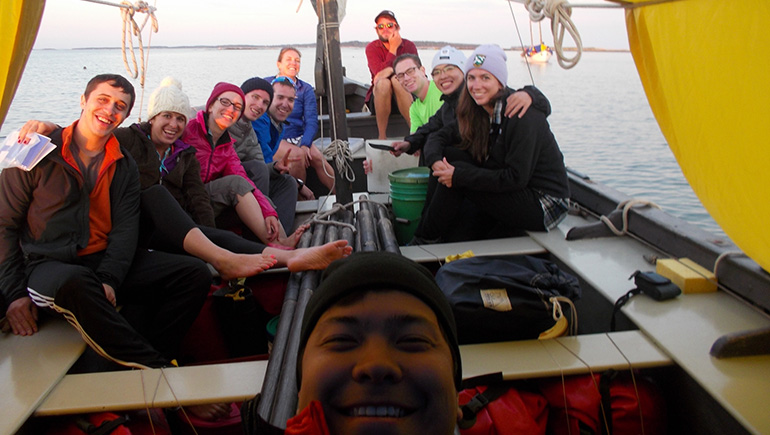 By Jamie Mittelman T’19 I’m lying on wooden oars, surrounded by snoring classmates who I met 12 hours ago, our boat gently rocking up and down. I’ve counted three shooting stars, my belly is full with the tacos my classmates made, and my arms dangle by my sides, sore from rowing—there was not much wind today. I had made fast friends with the two other ladies on sailboat Llama. As our instructor mentioned, holding up sarongs to give each other “privacy” while relieving ourselves has a tendency to bring you together quickly. It’s night one of Outward Bound, one of Tuck’s pre-orientation programs. Flash forward three weeks to the first day of school and Section 3 has the Analysis for General Managers course. We’re role playing a CEO on her first day; the company is under duress, countless employees approach with questions, and issues— both urgent and non-urgent—pop up. What do you do first and why? What are your priorities and how do your actions dictate how others will treat you as a boss and fellow employee? Section 3 is now sitting in the Leading Individuals and Teams course, assuming the managerial role of a firm’s top performer, Rob. Rob is leading our organization in sales, but he doesn’t fit in culturally. We had promised Rob a promotion when we had personally recruited him, but given the strong animosity directed towards him from throughout the organization, don’t know if a promotion is appropriate. How did we get in this situation and how could we have been better leaders? It’s now 9:30 p.m. and two girlfriends and I are sitting on my dorm room floor drinking a bottle of wine, toasting each other’s successes from the week: we had survived our first cold calls, gotten to know our study groups a bit better, made time for a yoga class or two, and even managed to log eight hours of sleep a night. Our plastic wine-filled Outward Bound mugs clink as we cheers. Fall A was a whirlwind of intense learning and growth. Tuck’s core curriculum of Analysis for General Managers, Managerial Economics, Statistics, and Leading Individuals and Teams lay a foundation of business skills I look forward to building on throughout my two years at Tuck. As someone with a background in corporate social responsibility and nonprofit management, Fall A courses pushed me to think in new ways. While historically I would have identified trends more qualitatively, Statistics gave me the ability to quantitatively explain patterns with confidence intervals. Managerial Economics taught me about how different business conditions such as the competitive nature of industries impact product prices and quantities. This said, while the courses of Fall B will continue to arm me with the hard skills I need to succeed in the business world, many of my greatest learnings have originated outside the classroom from simply being with my classmates. Tuck is an incredible academic institution, but what makes Tuck Tuck is the people who opt to be here. You don’t enroll at Tuck so you can intern part-time in the big city of Hanover, because you have a large established friend group that happens to be living in the Upper Valley, or because you’re drawn to the consistent warm climate of the Northeast. Tuckies opt in because we want to be a part of this community and as a result, students are actively engaged in all aspects of Tuck life. When I went on Outward Bound or was sat on my dorm floor, I was surrounded by individuals who were fully present, classmates who were and continue to bring their full selves to every activity. Last year when applying, I was struck by the following question on the Tuck website: “Are you ready to become part of something bigger than you?” Growing up I’d always been a community-oriented, people-first yes-woman. Want to try something new? I’m in. Ready to meet new people? Let’s host a party where we can only invite people we don’t know. That said, prior to Tuck, I had never been a part of such a large community where everyone fully wanted to be there, where every individual opted in and pushed each other to be the best versions of themselves they could be. Every day, I am humbled by how smart, creative, and just downright awesome my classmates are. To be blunt yes, I am excited about all the future courses I will have the opportunity to take, but I am even more psyched that I get to learn from my classmates, going on whatever adventure we choose to opt into next. If you’re a prospective student, I challenge you to opt in too. |
| FROM Tuck Admissions Blog: Real World Entrepreneurial Experience in an Academic Setting at Tuck |
 By H. Holland Davis T'18 I enrolled in Building Entrepreneurial Ventures (BEV) to get a sense of what it means to be an entrepreneur before I graduate and begin a career in finance. BEV is an experiential learning class at Tuck taught by serial entrepreneur Daniella Reichstetter T’07—executive director of entrepreneurship at the Center for Private Equity and Entrepreneurship, founder of Gyrobike, and an early hire at Method, Jetboil, and Belcampo—which is designed to help Tuck students found startups. Along with two of my classmates, Lars Matkin T’18 and Andrew D’Ignazio T’18, I started a company called NATOA, an online-based concierge outdoor gear maintenance service for the Dartmouth community. 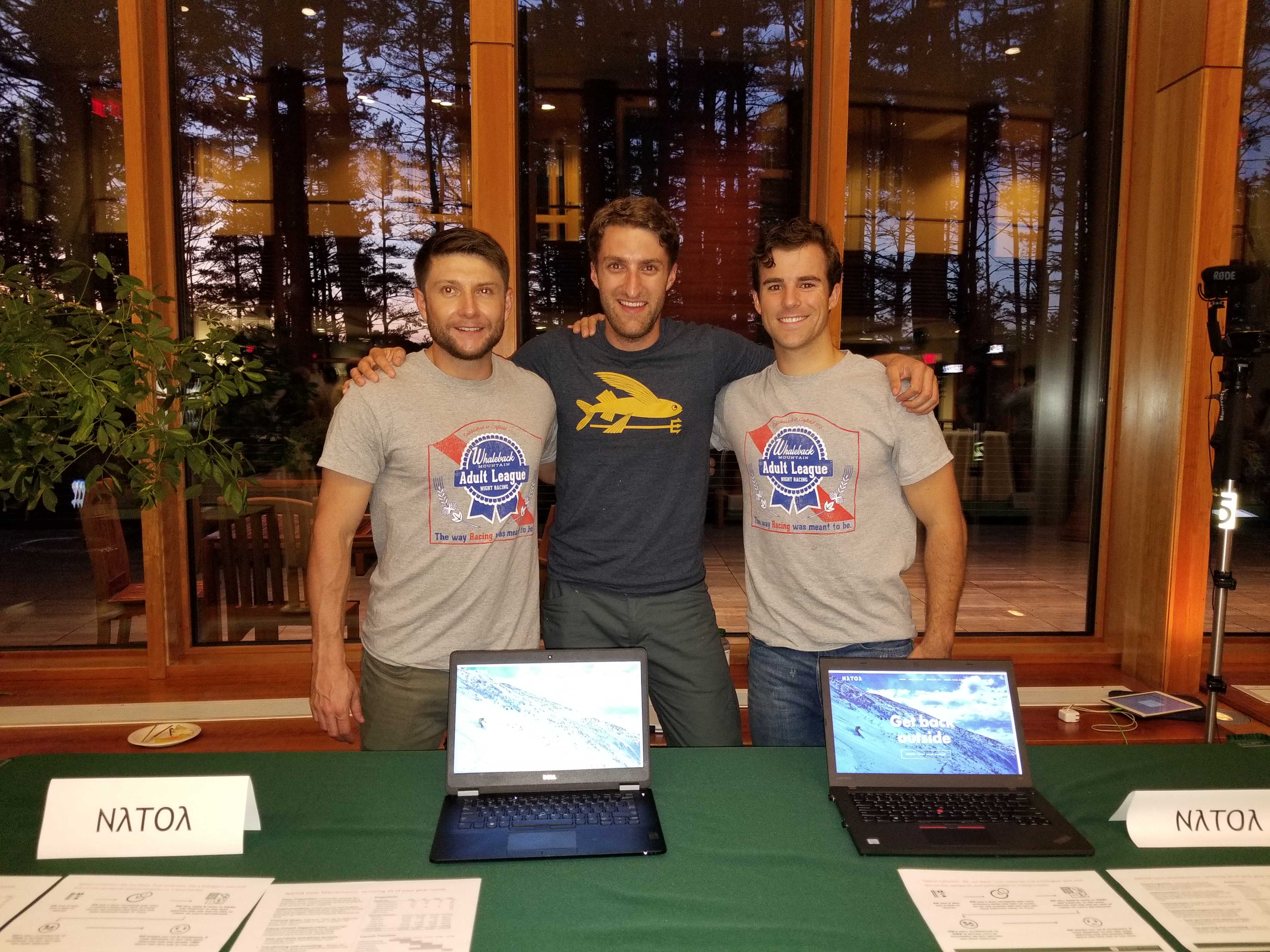 "BEV provided me with a much better framework for launching a successful business and I gained real-world experience grappling with the many challenges of launching a startup," says Davis. The course was structured to mimic an “incubator-model” with weekly pitches we presented to and received feedback from our classmates, visiting entrepreneurs and investors, followed by sequential lectures designed to help bring our ideas to fruition. This advice and the lectures helped us focus NATOA and develop a differentiated and valuable (hopefully) service that was missing for most Dartmouth students. Daniella provided us with weekly feedback and recommendations based on her experience starting and advising early-stage companies. She also brought in an impressive group of entrepreneurs and early-stage investors to share their experience and advise us on the do’s and don’ts of entrepreneurship. During the course we were also paired with a mentor, Daniel Philip D’03, T’12, founder of Outfittr, an outdoor gear rental company that has a lot in common with NATOA. Daniel helped us develop our subscription-based payment model and guided us through key decisions around the logistics of pick-up and delivery. One of the highlights of the course for me was Demo Night where we presented our minimal viable product—which for us was our website—to the Dartmouth community. I was also really impressed by my classmates’ demos—they were launching everything from a drone delivery company to an online bikini site designed for “all body types.” It was also a great way for us to get feedback on our idea from both potential customers and entrepreneurs. The positive feedback we received from this event was the catalyst for us to launch our business. BEV provided me with a much better framework for launching a successful business and I gained real-world experience grappling with the many challenges of launching a startup. We also had the opportunity to truly be entrepreneurs for the year. We plan to continue our business throughout our time at Tuck, and hopefully pass it onto the T’19s. This was particularly valuable for me because I would eventually like to start and manage my own business and the opportunity to gain exposure to what that means and get advice from real-world practitioners was incredibly helpful. If you want to learn more about our business, find us at natoagear.com! We’re excited to be helping our classmates keep their gear in shape so they can maximize their time in the Upper Valley. |
| FROM Tuck Admissions Blog: How I Leveraged Tuck’s Entrepreneurial Resources to Launch a Startup |
 By H. Holland Davis T'18 I enrolled in Building Entrepreneurial Ventures (BEV) to get a sense of what it means to be an entrepreneur before I graduate and begin a career in finance. BEV is an experiential learning class at Tuck taught by serial entrepreneur Daniella Reichstetter T’07—executive director of entrepreneurship at the Center for Private Equity and Entrepreneurship, founder of Gyrobike, and an early hire at Method, Jetboil, and Belcampo—which is designed to help Tuck students found startups. Along with two of my classmates, Lars Matkin T’18 and Andrew D’Ignazio T’18, I started a company called NATOA, an online-based concierge outdoor gear maintenance service for the Dartmouth community.  "BEV provided me with a much better framework for launching a successful business and I gained real-world experience grappling with the many challenges of launching a startup," says Davis. The course was structured to mimic an “incubator-model” with weekly pitches we presented to and received feedback from our classmates, visiting entrepreneurs and investors, followed by sequential lectures designed to help bring our ideas to fruition. This advice and the lectures helped us focus NATOA and develop a differentiated and valuable (hopefully) service that was missing for most Dartmouth students. Daniella provided us with weekly feedback and recommendations based on her experience starting and advising early-stage companies. She also brought in an impressive group of entrepreneurs and early-stage investors to share their experience and advise us on the do’s and don’ts of entrepreneurship. During the course we were also paired with a mentor, Daniel Philip D’03, T’12, founder of Outfittr, an outdoor gear rental company that has a lot in common with NATOA. Daniel helped us develop our subscription-based payment model and guided us through key decisions around the logistics of pick-up and delivery. One of the highlights of the course for me was Demo Night where we presented our minimal viable product—which for us was our website—to the Dartmouth community. I was also really impressed by my classmates’ demos—they were launching everything from a drone delivery company to an online bikini site designed for “all body types.” It was also a great way for us to get feedback on our idea from both potential customers and entrepreneurs. The positive feedback we received from this event was the catalyst for us to launch our business. BEV provided me with a much better framework for launching a successful business and I gained real-world experience grappling with the many challenges of launching a startup. We also had the opportunity to truly be entrepreneurs for the year. We plan to continue our business throughout our time at Tuck, and hopefully pass it onto the T’19s. This was particularly valuable for me because I would eventually like to start and manage my own business and the opportunity to gain exposure to what that means and get advice from real-world practitioners was incredibly helpful. If you want to learn more about our business, find us at natoagear.com! We’re excited to be helping our classmates keep their gear in shape so they can maximize their time in the Upper Valley. |

|
|
||
|
Hi Generic [Bot],
Here are updates for you:
ANNOUNCEMENTS
Tuck at Dartmouth
|